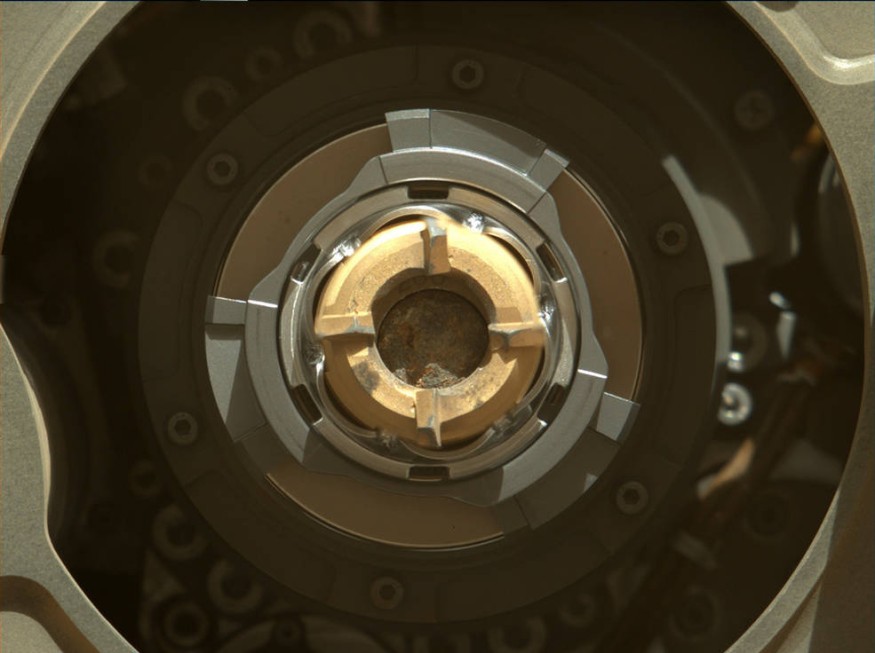NASA Perseverance rover has collected another Martian sample from its current exploration site.
The Perseverance rover drilled a core sample on Monday, filling a titanium tube with Red Planet rock for the third time.

Perseverance Rover Collects Third Sample Containing Olivine
The Perseverance rover has taken its third rock sample on Mars. The statement was made via a tweet on the rover's official Twitter account by the rover's team.
Another little piece of Mars to carry with me.
— NASA's Perseverance Mars Rover (@NASAPersevere) November 16, 2021
My latest sample is from a rock loaded with the greenish mineral olivine, and there are several ideas among my science team about how it got there. Hypotheses are flying! Science rules. #SamplingMars https://t.co/L6lhCNdqWq pic.twitter.com/bFXxExhS1P
"My latest sample is from a rock loaded with the greenish mineral olivine," the tweet reads.
Olivine, according to Space.com, is a magnesium iron silicate that makes up the majority of the Earth's upper mantle. The team behind the Perseverance rover has many hypotheses on how the olivine came up in the rock.
Olivine has been discovered in several unusual locations in space, CNet said. The material was found in craters on the massive asteroid Vesta by NASA's Dawn spacecraft. A "fingerprint" of olivine was discovered in a Martian soil sample by the Curiosity rover, investigating another region of Mars.
NASA did not further elaborate on the olivine theories floating around. Still, practically everyone should expect a lot more study as experts dig into the data. Under Percy's attentive supervision, the Jezero Crater is quietly disclosing its geologic past.
Perseverance Looks For Ancient Water Clues on Mars
The rover is presently investigating the Sétah area, where scientists believe the presence of unique rocks may reveal information about Mars' past and history of water presence.
According to Republic World, Perseverance is abrading rocks that exist in layers. This sort can only be generated in water.
Get a load of these layers! I’m getting out my abrading tool to take a look inside.
— NASA's Perseverance Mars Rover (@NASAPersevere) November 4, 2021
Layered rocks like this often form in water, and can hold clues about what their environment used to be like. Let’s see if this would be another good place for #SamplingMars. pic.twitter.com/2CYc4xF6nq
These rock samples will be brought to Earth shortly when NASA sends a spacecraft to recover them from Mars.
The rock samples, according to NASA, will aid scientists in piecing together Mars' historical history and provide insight into the planet's volcanic activity and times of persistent water.
ALSO READ : NASA Perseverance Rover Help Scientists See Ancient Rock From Mars' Surface; Signs of Flowing Water Revealed
Perseverance's Rock Collection
Since then, Perseverance has roved several hundred meters and in Sétah, a rough, dune-filled section of Jezero. The location has a diverse range of multi-layered rocks, which piqued the scientists' interest sufficiently to take a sample.
"Each layer records information about the environmental conditions present when the rock formed, and changes in layer thicknesses or textural expressions indicates an environmental change," Perseverance student collaborator Erin Gibbons, of McGill University in Canada, wrote in a blog post on Nov. 12.
The first two successful rock sample harvests by the Mars rover occurred in September. Both samples were obtained from a rock known as Rochette.
After the Perseverance rover failed on its first try, it took two tries to properly obtain the first rock sample. The rock sample that was collected on the first attempt was too crumbly to study.
The next Martian rock collection occurred only a few days following the first collection's success. In its first effort, the rover got it right.
RELATED ARTICLE : NASA Mars Perseverance Rover Cleanly Scrapes A Martian Rock To See Something 'No One's Ever Seen'
Check out more news and information on Space in Science Times.












